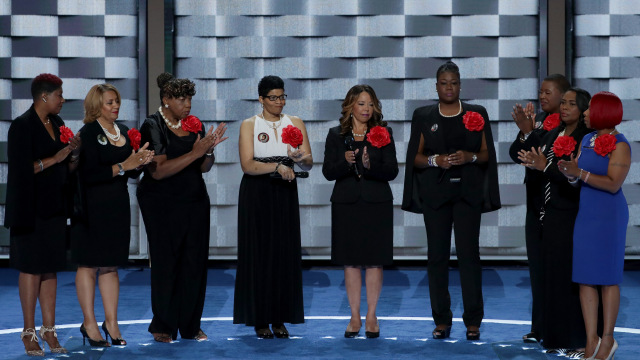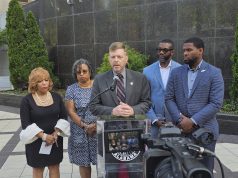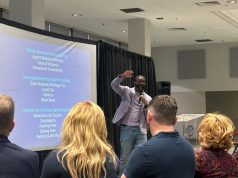
By Ken Thomas and Catherine Lucey
Associated Press

PHILADELPHIA (AP) — With mothers of police violence victims on the stage and anti-gun protesters in the streets, Hillary Clinton and Democrats are giving gun control and efforts to curb police violence a starring role at their summer convention.
A group of women who have lost children to gun violence or after contact with police took the stage to applause and chants of “black lives matter” on Tuesday at the Democratic National Convention. Known as the Mothers of the Movement, the group includes Sybrina Fulton, whose 17-year-old son Trayvon Martin was killed by a neighborhood watch volunteer in 2012.
“Hillary Clinton has the compassion and understanding to support grieving mothers,” Fulton said. “She has the courage to lead the fight for common sense gun legislation.”
Also taking the stage Tuesday were former U.S. Attorney General Eric Holder and Pittsburgh Chief of Police Cameron McLay, who said it is possible “to respect and support our police while at the same time pushing for these important criminal justice reforms.”
Clinton has made gun safety one of the foundations of her presidential campaign, vowing to overcome the legendary resistance of gun-rights advocates and their GOP allies to push for expanded criminal background checks and a renewal of a ban on assault weapons.
Her search for a breakthrough comes as Donald Trump has repeatedly touted the benefits of access to firearms as a way to counter to acts of violence. The Republican nominee promoted a law-and-order message at his convention, where speakers routinely expressed solidarity with police officers and decried the recent slayings of officers in Dallas and Baton Rouge, Louisiana.
Yet Democrats view the recent spate of mass shootings and police-involved killings as turning the tide in favor of new restrictions on firearms and a catalyst for criminal justice reform.
“This is the moment,” said Melissa Mark-Viverito, the speaker of the city council in New York.
Indeed, Americans increasingly favor tougher gun laws by margins that have grown after the spate of recent mass shootings, according to a recent Associated Press-GfK poll. Almost two-thirds say they support stricter laws, with majorities favoring nationwide bans on the sale of semi-automatic assault weapons such as the AR-15 and on the sale of high-capacity magazines holding 10 or more bullets.
Both conventions have coincided with a wrenching period of violence and unrest, both in the United States and around the world. Last month, a gunman opened fire in a crowded gay dance club in Orlando, Florida, killing 49 people and injuring dozens more in the worst mass shooting in U.S. history.
Still, despite a spate of high-profile shootings in recent years, including the 2012 slaying of 20 first graders and six adults at a Connecticut school and the murder of 9 African-American church members at a Charleston church last year, Democrats have largely failed in their efforts to change federal gun laws.
In the recent AP-GfK poll, less than half of Americans said they believe gun laws will get tougher in the coming year. But advocates for gun control say the political landscape has changed dramatically since the 1990s, when then-President Bill Clinton blamed heavy losses in the 1994 mid-term elections in part to a public backlash against the ban on certain military-style weapons. That ban expired after 10 years and has not been renewed.
“It’s clearly not 1994 anymore,” said Mark Kelly, the husband of former Arizona Democratic Rep. Gabby Giffords, who was seriously wounded in a 2011 shooting in Tucson that left six people dead.
Sen. Chris Murphy, D-Conn., said the shifting landscape is the result of several factors: Shootings such as the Sandy Hook school massacre in 2012, renewed concerns over terrorism and high-profile killings of black men in several cities.
“For the first time, this is a winning issue in the general election,” Murphy said.




